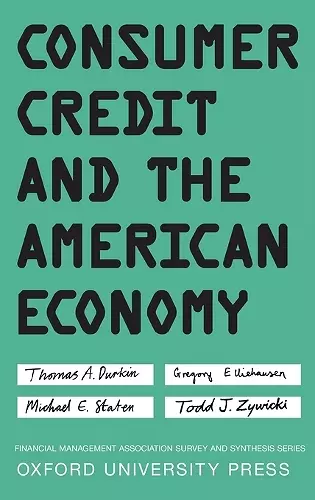Consumer Credit and the American Economy
Todd J Zywicki author Thomas A Durkin author Gregory Elliehausen author Michael E Staten author
Format:Hardback
Publisher:Oxford University Press Inc
Published:28th Aug '14
Currently unavailable, and unfortunately no date known when it will be back

Consumer Credit and the American Economy examines the economics, behavioral science, sociology, history, institutions, law, and regulation of consumer credit in the United States. After discussing the origins and various kinds of consumer credit available in today's marketplace, this book reviews at some length the long run growth of consumer credit to explore the widely held belief that somehow consumer credit has risen "too fast for too long. " It then turns to demand and supply with chapters discussing neoclassical theories of demand, new behavioral economics, and evidence on production costs and why consumer credit might seem expensive compared to some other kinds of credit like government finance. This discussion includes review of the economics of risk management and funding sources, as well discussion of the economic theory of why some people might be limited in their credit search, the phenomenon of credit rationing. This examination includes review of issues of risk management through mathematical methods of borrower screening known as credit scoring and financial market sources of funding for offerings of consumer credit. The book then discusses technological change in credit granting. It examines how modern automated information systems called credit reporting agencies, or more popularly "credit bureaus, " reduce the costs of information acquisition and permit greater credit availability at less cost. This discussion is followed by examination of the logical offspring of technology, the ubiquitous credit card that permits consumers access to both payments and credit services worldwide virtually instantly. After a chapter on institutions that have arisen to supply credit to individuals for whom mainstream credit is often unavailable, including "payday loans " and other small dollar sources of loans, discussion turns to legal structure and the regulation of consumer credit. There are separate chapters on the theories behind the two main thrusts of federal regulation to this point, fairness for all and financial disclosure. Following these chapters, there is another on state regulation that has long focused on marketplace access and pricing. Before a final concluding chapter, another chapter focuses on two noncredit marketplace products that are closely related to credit. The first of them, debt protection including credit insurance and other forms of credit protection, is economically a complement. The second product, consumer leasing, is a substitute for credit...
This is a book for both professional economists who do and do not specialize in this field and for informed laypersons who want to understand better this important facet of the economy. For the first time a single work brings together the history, economics, sociology, law, and regulation of consumer credit markets and institutions. It will become the standard source and reference for questions of public policy in this important area. * Timothy J. Muris, George Mason University and Former Chairman, Federal Trade Commission *
If you think the development, history, and behavioral aspects of consumer credit are not exciting, read this comprehensive treatise of the topic as an emergent order of behavioral and parallel institutional rules, with no commanding identifiable leader. Particularly informative and original is their examination of the cognitive biases, experimental, and behavioral literature. * Vernon L. Smith, Chapman University and Nobel Laureate in Economics *
The Financial Management Association's Survey and Synthesis Series provides volumes to examine the most important areas of financial systems. This book far exceeds this goal for the consumer credit sector. Written by highly regarded experts, it is the most comprehensive work available for consumer credit, and it is comprehensible. The book is valuable for those who want to understand the institutional importance, role, regulation, and growth of consumer credit as well as for theorists and scholars who develop sophisticated neoclassical and behavioral demand and supply models. * David A. Walker, Georgetown University and Former President and Board Chair, Financial Management Association International *
Much of the political debate in the United States revolves around the question of whether the government should allow individuals to make their own choices or should protect them against the wrong decisions by limiting the available choices. Nowhere is this issue more trenchant than in what is known as consumer protection, and nowhere is there likely to be a better and more comprehensive analysis of consumer finance, its role in a consumer economy, and the issues surrounding the government's role than this book provides. * Peter J. Wallison, American Enterprise Institute and Former General Counsel, US Treasury Department *
ISBN: 9780195169928
Dimensions: 162mm x 247mm x 43mm
Weight: 1193g
734 pages